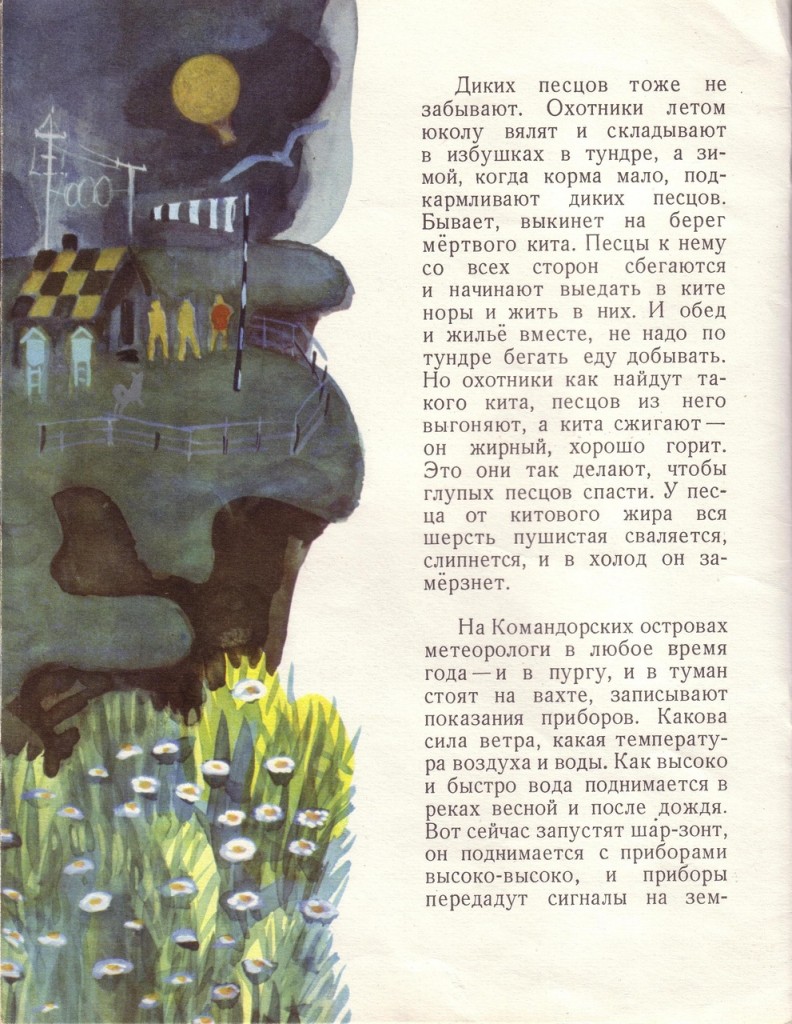На Командорах / On the Commander Islands – Meteorologists and sled dogs
 Quick and dirty translation, part 4. See also, part 1, Fur Seals, part 2, Sea Birds and part 3, Foxes.
Quick and dirty translation, part 4. See also, part 1, Fur Seals, part 2, Sea Birds and part 3, Foxes.
На Командорах [Na Komandorakh] On the Commander Islands. Author: Gennady Snegirev. Artist: M. Miturich. Izdatel’stvo “Malish”. Publisher “Little One”. For older preschoolers. A print run of 350,000 in 1975. Cost, 16 kopecks.
Full Russian book scanned here.
On the Commander Islands there are meteorologists at any time of year — in snowstorms and in fog they keep watch, marking down readings from their instruments. The strength of the wind, the temperature of the air and water. How high and fast the water flows in the rivers in the spring and after rain. Just now they let go a weather-balloon, it carries instruments high-high and the instruments transmit signals to earth about what’s happening at that altitude. The flouds fly in one direction and still higher, perhaps, the wind blows in the complete opposite direction, and they need to know how strong the wind is and at what altitude it blows. If a pilot doesn’t know this exactly, he can neither take off nor land a plane.
It’s not just aviators who need to know everything about the weather, but also sailors who direct ships and fishermen who go out on the sea and catch fish need to know what they weather will be. On the radio the meteorologists say that a storm is moving from north to south, perhaps inthe same place that that the fishermen are heading. The fishermen receive the information and go to a different fishing ground.
In the winter you need a вездеход [vezdehod – all terrain vehicle] to get to distant mines. The weather’s good, the sun is shining, there’s no wind, but the meteorologists on the Commander Islands report that they expect strong wind and snow. That means no one goes out: the vezdehod loses traction in the snow and people can freeze to death.
In the North a blizzard lasts for several days and when the winds calm it is as if the vezdehods were never there — just smooth snow shines in the sun. For the vezdehods, along with the houses up to the chimneys, are covered with snow, and as soon as the snow storm stops people with shovels begin digging themselves out.
No one values the work of the meteorologists like the people of the sea, the taiga and the tundra.
This may be seen by the status of University of Washington weather guru Cliff Mass in the Puget Sound area. Having seen him at a science journalism talk, he’s on my list of local celebrity sightings, along with Dale Chihuly, who I saw at a movie theater. But back to the RFE!
The Commander Islands are the first to received the blows storm winds and the ocean waves from underwater volcanic eruptions – tsunamis.
That’s why the service of the meteorologist on the Commander Islands is essential.
Earlier in the summers people traveled over the Commander Islands on dog sleds.
The sled dogs work in teams and the hunter knows which dogs are better to lead, and to the put the weaker dogs behind.
And if a sled dog is lazy and only pretending to pull, the other dogs will bite and snap at it while the sled speeds across the tundra. The whole team of dogs listens to the leader — the dog which runs in the front. The lead dog is the strongest and smartest.
Often the dogs save the life of trapper. A blizzard starts — the hunter digs out a pit in the snow, unharnesses the dogs, and lies in the pit together with the dogs. Snow covers them and the dogs keep the hunter and each other warm. And they eat yukola — dried fish. The hunter gives them all a share.
And the people of the tundra always speak lovingly of the dog — doggies. And the hunters worry about the dogs like people — they are true workers.
The team grows tired of running the sled over the Commander tundra in the summer. It’s hot, the doggies lay down in a pond and rest, cool off. Until the doggies have rested, the hunter goes no further.
And that’s the end of this little book, which was not much on transitions but provided me with a wealth of interesting info and a fun translation exercise. Now I’ve got to find some time to get through another one of my new books, Повелитель ветров [Povelitel’ vetrov] Lord of the Winds, since it is also about meteorologists.